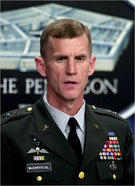 So, the report written by ISAF commander, Stanley McChrystal, to President Obama on NATO’s Afghan mission has been published. It does not contain a request for more US troops, but most analysts think it is only a matter of time before a request is sent from Kabul.
So, the report written by ISAF commander, Stanley McChrystal, to President Obama on NATO’s Afghan mission has been published. It does not contain a request for more US troops, but most analysts think it is only a matter of time before a request is sent from Kabul.
In the recently-published report, McChrystal says: “While the situation is serious, success is still achievable.” But serious changes will be required. These will have to address what McChrystal calls “The weakness of state institutions, malign actions of power-brokers, widespread corruption and abuse of power by various officials.” The US general also admits “ISAF’s own errors”. Bear in mind, though, that the report was written before the recent presidential elections went awry. It would probably read even worse today.
A couple of things come through clearly in the report. First, that NATO is not able, at least for the time being, of undertaking a counter-insurgency mission. McChrystal says his command is “not adequately executing the basics” of counterinsurgency. He has a couple of things in mind, including too much time spent by soldiers in “armored vehicles or behind the walls” and the fact that so few speak any local languages. Second, the US general is clear that only a few countries participating in the NATO mission are doing a good enough job. Third, the report notes that the relative level of civilian resources must be balanced with security forces, “lest gains in security outpace civilian capacity for governance and economic improvements.”
Going forward, McChrystal proposes speeding the growth of Afghan security forces. The existing goal is to expand the army from 92,000 to 134,000 by December 2011. The NATO general wants to move that deadline to October 2010. But, as Coffee House readers may remember from my Kabul dispatches, this will not be easy. McChrystal also demands “radically more integrated and partnered” work with the local forces. But, whether any other forces than those of the US can undertake this kind of mentoring, all the way down to company-level, remains in doubt.
Finally, McChrystal says the military must play a greater role in winning over to the government side less committed insurgent fighters. Coupled with the recent admission that former British general Graeme Lamb has been sent to Kabul to repeat his insurgency-mediating trick from his time in Iraq, this represents a serious push on reconciliation by the US administration.
Will it work? I hope so. If approved by President Obama, alongside an additional surge in US troops, it may be the last best shot for NATO – and ordinary Afghans.






Comments